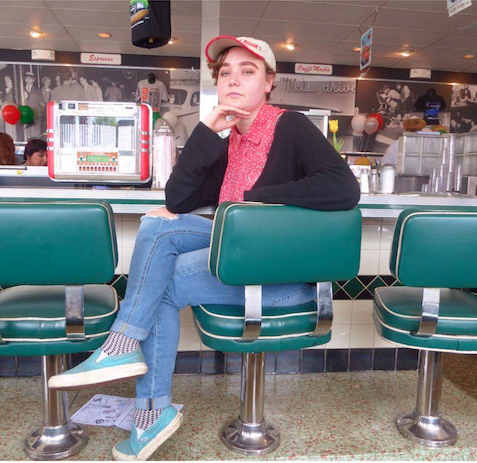ISSN: 1941-4137
POETRY THAT ENACTS THE ARTISTIC AND CREATIVE PURITY OF GLASS
POETRY THAT ENACTS THE ARTISTIC AND CREATIVE PURITY OF GLASS

Kaiya Gordon is a poet, photoshop aficionado, and youtube fan, who lives and works in the San Francisco Bay Area. Kaiya's work is interested in regional California aesthetics, body and disassociation, and examining the emotional failures of language. Kaiya attended the 2014 Northwestern Undergraduate Conference on Literature with a collection of poetry, and their work has been published by The American Academy of Poetry and IPRC's 1001 Journal. This summer, Kaiya will be a poet-in-residence at Residency In The Garden in Portland, Oregon.
Also by Kaiya Gordon:
self portrait (so much depends)
The Fish
What I wanted
was to watch the fish forever —
— how the waves would sweep them up, and
carry them towards the shore.
How they made the water glimmer,
with their rippling bodies —
Scared when we first saw them,
laid on the sand in millions, dead,
we drew back into the Santa Cruz cliffs.
But I loved the sharp disgust we
felt. I loved watching others crush them,
loved feeling appalled. Later,
we admired those who stepped on the
fish, the contact between them.
Furtive, we stepped too, then looked to
see if anyone had noticed.
Then we ran, and played with ocean
foam and we forgot about the fish —
— Now we drive, through
Santa Cruz. And I roll down my
window, eavesdropping on houses
pushed together, sharing secrets.
Out of the car, we run through the
dark street, giddy, massive, and I
hold myself, and think: this is the
first time I have lived without a
ribcage. We buy coffee, entrees,
eating under diner-fluorescent
light. I think: my heart has grown bigger
than my hands — —
And while we ran, and while we ate, the fish
came back to life. Gills, crusted and sandy,
bloomed outward to become legs. Mouths
invited oxygen in with gasps; a million
tails stretched out in ecstasy. With that first shock,
they all jumped up: against the setting sun
the fish were dark, the million fish, the fish —
And ocean settles over me like a scarf,
and I press scales into the corners of my eyes.
Now I remember giggles that melted
into ice cream on the roof of my car.
Now I remember our legs, the outfit I
had planned for days, the fineness of your hair.
— The diner squatting furtive, dark, mosquitos
whining, brushing the curve of your neck, the
boy picking fish eyes from between his toes.
And now I curve myself into ocean;
now I loosen my hair, let it flower;
now I remember canvas shoes you wore;
the way my stomach ached; now driving
into the butter air — —
Now we are here: the three of us standing before a wave of fish.
The sea takes the fish in and cradles them,
and each tide whispers with the sound of fish scales
scraping against rock. We don’t talk for a long time.
I soften my gaze to look at the sun. In the light the scales glint.
The fish blink, then wiggle.
"The Fish" was written after a day trip to Santa Cruz, California, during which my friends and I came across thousands of dead silver fish, which had died during a summer heat wave. I was struck by both the visceral, disgusting nature of the bodies, and by their innate beauty. It was shocking how easily I was able to first empathize with death, and then how I forgot about it later, when I was engrossed by the thrill of being young and at a beach. One dead thing felt relatable, but thousands of dead things became morally and aesthetically confusing.
Glass: A Journal of Poetry is published monthly by Glass Poetry Press.
All contents © the author.
All contents © the author.





